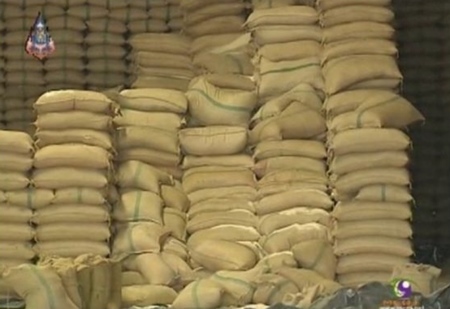BANGKOK, July 3 – Corruption has penetrated every step of the government’s rice purchase scheme as the Commerce Ministry has refused to disclose information on rice sales, according to a senior Finance Ministry official.
Deputy permanent secretary for finance Supa Piyajitti told a Senate committee that corruption was involved from the first stage of farmers’ registration to reports on rice volume which were falsified.

The Senate standing committee on economic, commerce and industry invited Ms Supa to give an account on the rice pledging scheme in her capacity as chairwoman of the Finance Ministry’s sub-committee tasked with the scheme’s account assessment.
She said only 10 per cent of rice in the government’s stockpiles had been randomly checked due to lack of manpower, adding that rice sold under the scheme was rotated at some rice mills.
Total losses from the state’s rice subsidy scheme from 2004 to 2013 which included 14 harvest seasons were as high as Bt378 billion while losses in the last three seasons, between 2011 and 2013, were Bt221 billion.
As of January 31 this year, the government has spent more than Bt496 billion for the rice purchase programme – which has to be paid to the Bank of Agriculture and Agricultural Cooperatives, Ms Supa explained.
The government’s report of 11 million tonnes of rice in its stockpiles contradicted the figure of 18 million tonnes given by the Marketing Organisation for Farmers and the Public Warehouse Organisation, she told the committee.
Ms Supa said she had asked the Commerce Ministry for the figure of rice sales but was told that it was confidential.
“They told me that only three persons – the commerce minister, permanent secretary for commerce and director general of the Foreign Trade Department – had access to the figure,” Ms Supa said.
“We could not pursue our accounting to close entries and we do not know to whom the 10 million tonnes of rice were sold.”
A standing committee member, Mahannop Dejvitak, said the government lacked corruption prevention measures and some lots of rice were resold to make double profits from the pledging scheme.
The rice storage standard was poor, resulting in deteriorating quality, he said.




